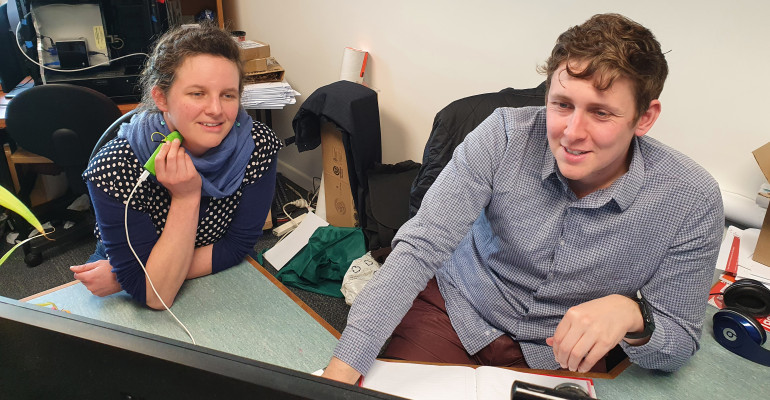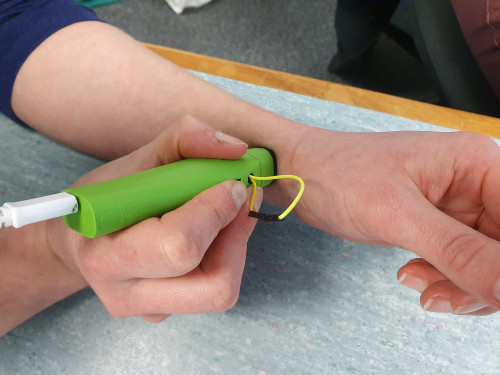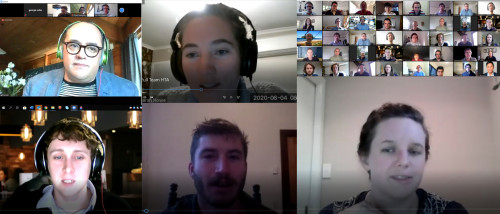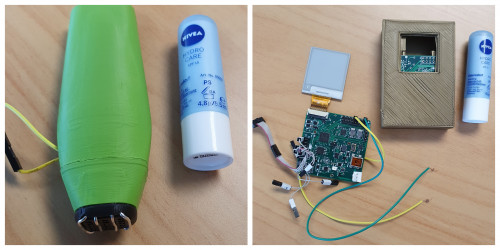The right tech, the right time, the right connection
21 August 2020 | Read time: 6 minutes

The bloodless blood test: When science meets the market.
A team of young postdoc and PhD students based at the University of Canterbury (UoC), sit huddled nervously around a laptop in a video conference with people who could open doors and make all their hard work into something game changing for Aotearoa New Zealand, and the world.
The UoC team headed up by Jake Campbell and Jennifer Knopp and including: Sarah Howe and Lachlan McKenzie are part of SfTI’s Home and community based care – Type 2 diabetes Spearhead project, led by distinguished Professor and SfTI MedTech Theme Leader, Geoff Chase. They have been developing needle-free, light-based glucose sensors which allow quick and accurate blood glucose readings to be taken in the home without pricking the skin.
Professor Chase explains, “This would give those with Type 2 Diabetes a far easier and non-invasive treatment option at far lower cost. Which would not only improve quality of care but equity of access to care.”

Rewa, connecting researchers to the “right people”
The UoC team now connects, screen-to-screen in a remote post COVID-19 meeting with the Price Waterhouse and Coopers (PWC) Diabetes team, including senior Partner, Tamati Shepherd.
SfTI connected the UoC and PWC teams via its new co-funded pre-accelerator program, ‘Rewa’. Developed in partnership with Kiwinet, Rewa is designed to put promising research on a trajectory to commercial success. The UoC team were one of seven teams that participated in the programme, and called themselves the ‘Health Tech Access’ team.
Tamati is well placed to help the Health Tech Access team access the resources and people to take this break-through science to the next stage. He explains how he will directly benefit from its success:
“I not only have Type 2 diabetes, but I can think of many others within my immediate whānau who are as well... this is a huge area of need in NZ and a place where there are funds and motivation to make things better.”

A better option for NZ’ers with Type 2 Diabetes
Tamati is representative of a very New Zealand issue. Ministry of Health statistics from 2014 state that Māori are 50% more likely to self-report they are sufferers of Type 2 Diabetes.
He says, “I don’t check my levels with a needle. I just hate doing it. I can imagine I am potentially putting myself at risk by doing this. But I know I am not the only one.”
Needle-free blood testing is a hot topic around the world as global estimates show treating Type 2 diabetes consumes at least 1.0% of gross domestic product (GDP) each year. For Jake and Jennifer and team this is really exciting, and for SfTI this potential is perfectly inline with our mission to create great economic and wellbeing benefits for NZ and internationally.

Looking to the future and considering the market
Rewa, meaning to ‘elevate’, which was a first in NZ KiwiNet initiative brought over from Australia, not only helped participants think about their technology as a product and consider the market in more detail, but it gave them access to mentors and tools that could set them on the right path. During the programme the potential of Health Tech Access’ needle free glucose sensor was blindingly obvious to Tamati Shepherd. He saw huge opportunity within the Māori economy and he was keen to help find the right next steps to connect the team with the right market to make the most impact.
SfTI as a co-host of the Rewa program, invited Tamati to speak to the participants about the opportunities of the Māori economy. His advice was to engage and start talking early and build relationship first:
“I’d say to scientists who want to co-develop tech for Māori, they need to put down the powerpoint and pick up a tea towel.”
“Culturally you need to really listen to your market and understand their experience, not just go in their and try to sell them your science”
Tamati and the team at PWC are looking for opportunities to connect the Health Tech Access team to Type 2 diabetes sufferers who can take part in trials, plus they could make connections that could lead to future funding for Health Tech Access.
It also became clear during Rewa, that this was a tech that would not only be game changing for those with Diabetes, but potentially for the massive market of anyone needing a non-invasive blood test.
During the meeting with PWC, Tamati said excitedly to the young team: “You guys are on the edge of something huge.”
Future opportunities are endless
For Jake Campbell Rewa was an incredible and fast moving journey that took place largely during NZ’s COVID-19 Level 4 Lockdown.
“We have spoken with 100 people about our product, we’ve connected with experts who know what it is to take tech to product level. And making this connection with Tamati and PWC is invaluable to us”.
The Health Tech Access team are currently preparing for clinical trials with their light-based glucose sensor prototype, predicted to cost less than NZ$100 in materials to make.